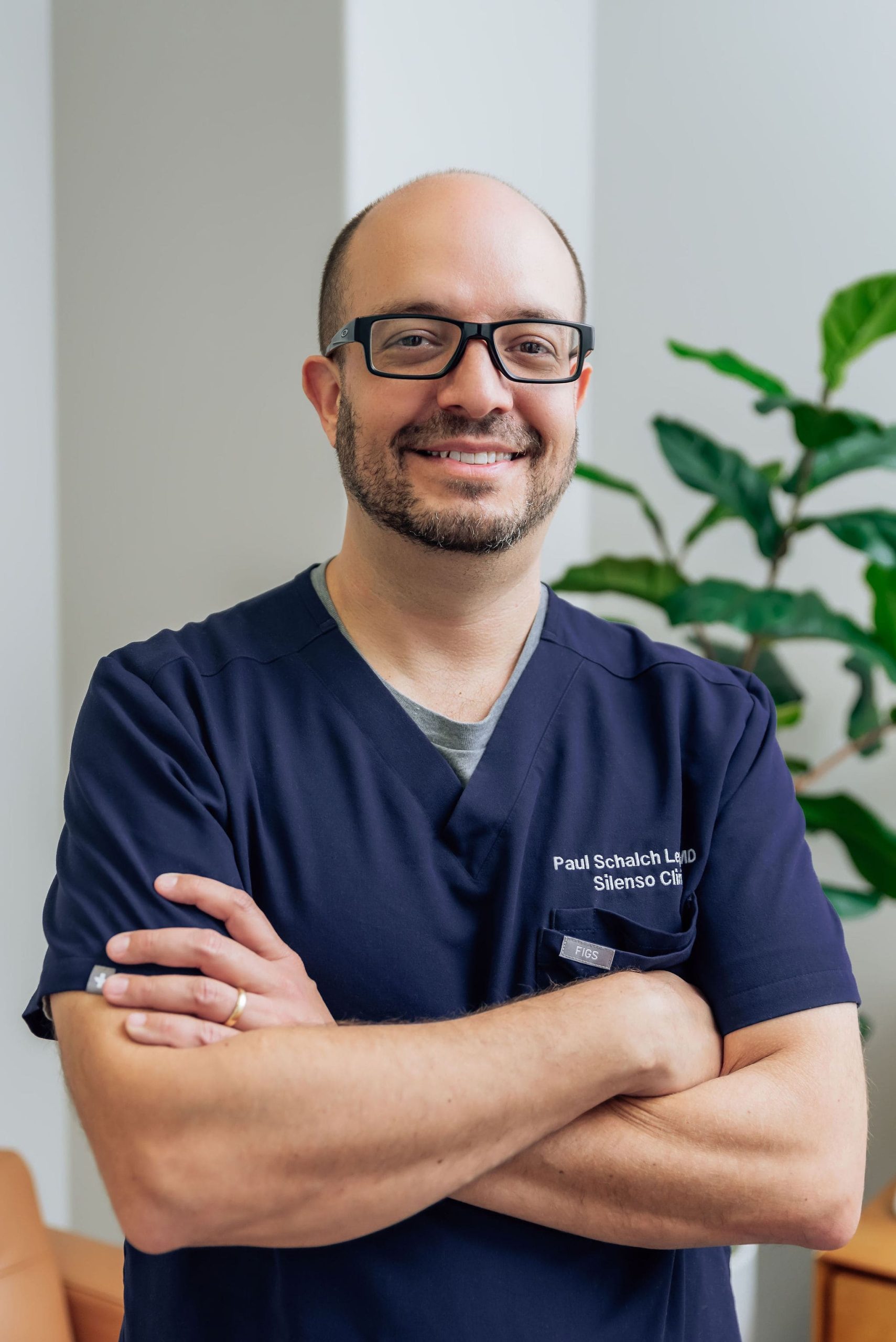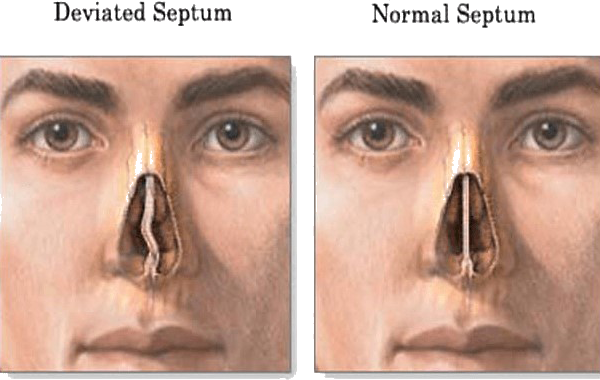Deviated Septum Surgery in San Diego
Approximately 80% of people have a septum that deviates to some degree. Deviated septum surgery is a procedure that corrects the crookedness of the nasal passage.
Silenso Clinic’s Dr. Paul Schalch Lepe, a board-certified otolaryngologist and sleep medicine specialist, discusses deviated septum surgery and helps patients decide if they may be a candidate for this kind of procedure.
We also discuss what to expect during the consultation, preparation, and operation process and how long it will take you to recover after your deviated septum surgery.
If you wish to address a deviated septum, then reach out to Dr. Paul Schalch Lepe at (858) 925-5800 or fill in his contact form to arrange your consultation in San Diego today. Silenso Clinic is located in Carmel Valley in North San Diego County and proudly serves many communities throughout the greater San Diego area, including La Jolla, Carlsbad, Encinitas, Del Mar, Coronado, Eastlake, Chula Vista, Rancho Santa Fe, and more.

Specializing in the treatment of a variety of conditions (deviated septum, nasal obstruction, snoring, obstructive sleep apnea, etc.), Dr. Schalch Lepe is highly qualified and motivated to provide his patients with the best possible treatment results. Dr. Schalch Lepe takes an in-depth, personalized approach with each patient to ensure they receive the best possible treatment for their situation.
Originally from Mexico City, Mexico, Dr. Schalch Lepe has the unique perspective of having trained in multiple countries. This experience has led him to be sought out by domestic and international patients, many of whom are Mexican ex-pats living throughout San Diego County and Southern California.
What is a Deviated Septum?
The septum is the cartilage in the nose that separates the nostrils. People can have deviated septums from birth, but injuries sustained during life can also lead to a deviated septum.
For some people, a deviated septum has no impact on their daily life. For others, it can cause distress either aesthetically or medically.
When a patient becomes concerned by the appearance of their septum or a deviation starts to inhibit their breathing, there are surgical options available to correct the issue.
What Symptoms are Associated with a Deviated Septum?
As shown, a deviated septum is a bend in this cartilage. Multiple symptoms can signal a deviated septum that may require surgical intervention:

- Difficulty breathing through your nose. If you’re struggling to inhale and exhale through your nose, then you likely have a significant obstruction in one or both nostrils. Allergies, the flu, and seasonal colds make this more noticeable due to swelling and congestion.
- Nosebleeds. A deviated septum can dry out your nasal passage, leading to fragile skin that is more susceptible to nosebleeds.
- Snoring. A deviated septum can constrict airflow, which can lead to snoring.
- Dry mouth. Oftentimes, when the nose is obstructed, patients compensate by breathing through the mouth. This leads to the mouth drying out, which can contribute to bad breath.
- Compromised sleep quality. When a deviated septum impacts nasal breathing, sleep quality is compromised as patients can experience a shortness of breath during the night, or in more severe cases, experience sleep apnea.
- Headaches. A deviated septum can lead to a build-up of pressure in the sinuses, which results in an uncomfortable tightness around the eyes and forehead. This can lead to headaches.
How can Surgery Fix a Deviated Septum?
Septoplasty is the surgical procedure used to fix a deviated septum.
In a septoplasty procedure, Dr. Schalch Lepe creates a small incision inside the nostrils, through which he can manipulate and realign the septum.
How Will Dr. Schalch Lepe Treat My Chronic Sinusitis?
If a deviated septum is causing you distress, either on an aesthetic or medical basis, then a consultation with a board-certified otolaryngologist and sleep medicine specialist should be your first course of action.
In your initial consultation, Dr. Schalch Lepe will assess your overall health and discuss, in depth, how your deviated septum is impacting your daily life.
If, during this consultation, you realize that:
- Your sleep and quality of life is being impaired
- Your snoring is impacting the sleep of your partner
- You have blockage of one or both sides of your nasal passages
Dr. Schalch Lepe will listen to your concerns and provide his expert opinion on the next best steps. If septoplasty is indicated, Dr. Schalch Lepe will help you plan your surgery, obtain authorization from your insurance company (we don’t do cosmetic, cash procedures, unlike plastic surgeons. At least not very frequently), and set dates for the next appointments and surgery.
Septoplasty surgery can sometimes be done in-office, but more commonly on an outpatient surgery basis. Similarly, the anesthetic can be local or general. It depends on the patient in question and the degree to which the septum needs correcting.
In most cases, septoplasty surgeries take between 30-60 minutes. Dr. Schalch Lepe performs the latest FDA-approved procedures, which minimizes operative duration while encouraging faster healing and recovery, and minimizing downtime, allowing patients to return to work after a few days
Recovery from septoplasty surgery varies between patients, but most individuals are back to work within a week.
As the breathing passages are somewhat compromised with surgery, patients must ensure they don’t exert too much stress with forceful inhalation or exhalation as they recover. Doing so runs the risk of preventing incisions from healing and extending the recovery time.
Dr. Schalch Lepe recommends patients take at least two weeks rest from strenuous physical activity post-operation. Also, patients should be careful when blowing their nose, squeezing their nose, or getting their nose wet during the first 10-14 days after the procedure.
Better Breathing Starts Today!
Dr. Paul Schalch Lepe is a renowned breathing and sleep surgeon. His greatest pride is giving his patients the ability to breathe, sleep, and feel their best using the latest, innovative surgical and non-surgical procedures.
Does Insurance Cover Septoplasty?
In most cases, medical insurers will cover septoplasty surgery on the basis that it is a “medically necessary procedure.” Because patients can experience medical discomfort due to a deviated septum, solving the issue is considered necessary to that patient leading a full and rich life. As such, insurers will likely cover the procedure.
Why is Dr. Schalch Lepe One of the Best Septoplasty Surgeons in San Diego?
Dr. Schalch Lepe is a breathing and sleep surgeon specializing in a variety of ailments (chronic sinusitis, nasal obstruction, obstructive sleep apnea). Treating each of these conditions helps his patients live improved, fulfilled lives by breathing better and sleeping easier. Dr. Schalch Lepe takes an in-depth, personalized approach with each patient to ensure they receive the best possible treatment for their situation.
Originally from Mexico City, Mexico, Dr. Schalch Lepe has been fortunate to gain unique perspectives and experience from his international training. This experience has led him to be sought out by domestic and international patients, many of whom are Mexican ex-pats living throughout San Diego County and Southern California.
San Diego Deviated Septum Surgery
Septoplasty is the best way to treat your deviated septum, and Dr. Schalch Lepe’s experience as a breathing and sleep specialist makes him one of the most skilled, qualified, and reliable professionals to consult for your treatment.
If you’re experiencing a deviated septum, then reach out to Dr. Schalch Lepe. Contact (858) 925-5800 or fill out his online form to begin your journey towards a better life. Here at Silenso Clinic, we also offer treatments for a number of other conditions, including deviated septum, nasal obstruction, chronic rhinitis, obstructive sleep apnea (OSA), snoring, and chronic tonsillitis (tonsil stones).
